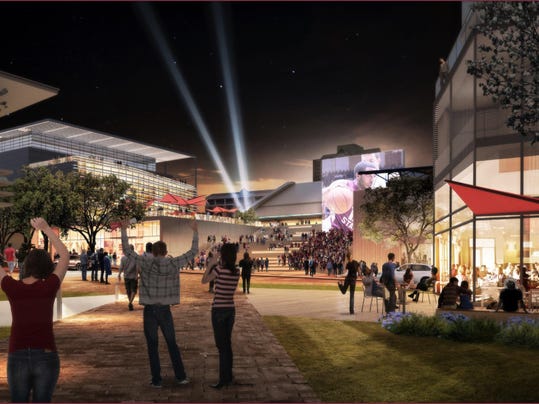FSU Arena District
"More than 250 associations are based in Tallahassee, a city where those same groups are shut out of hosting large conventions at home.
Frustrating, yes, but hardly a new issue in the state’s capital. However, Florida State University’s plan for an “Arena District” creates a new opportunity for that -- and then some.
A master plan outlines an ambitious and lucrative vision for the university and city. A future convention center. A new hotel. Relocation of FSU’s College of Business. An expanded Basketball Training Center and more, including parking.
FSU hired Architects Lewis + Whitlock of Tallahassee and Sasaki Associates of Watertown, Massachusetts, to complete an early study of what’s possible. Now the university is considering proposals from interested master developers nationwide.
“The process is confidential until we get to the final negotiation and then everything becomes formal,” said Dennis Bailey, senior associate vice president for facilities at Florida State University. The deadline to submit proposals has passed.
The proposed project is earmarked for a mix of funding, including Blueprint tax revenue. Private funds are slated for the convention center, a key component in the district eagerly being anticipated among economic development and tourism officials.
“It would put us in a position to compete for business that we have not been able to compete for in the past,” said Lee Daniel, executive director of Leon County Tourism Development, also known as Visit Tallahassee.
Convention business is year round particularly for Tallahassee-based associations. A 1,000-delegate convention could spur $739,000 to $1.1 million in economic impact, Daniel said. A single event could support nearly 300 jobs, he added.
“Just think if you could get 20 percent of their annual meetings once every five years,” Daniel said. “The economic impact would be huge.”
FSU has already begun improvements to the Tucker Civic Center and fundraising in the effort to relocate the School of Business.
The district’s design falls along six key themes: academics, athletics, retail and lifestyle options, a convention campus, signature outdoor attractions and green space and connectivity.
“The whole idea is to create a very active, urban environment that is very conducive to the student life but also appeals to the alumni, faculty and greater Tallahassee,” said Will Butler, Tallahassee-based asset manager and president of Real Estate InSync.
Butler, who’s been hired by FSU, his alma mater, said the entire project could cost between $350 million and $500 million. It will cover 20 acres in the urban core — downtown and the university’s capital complex two blocks to the east and, to the west, is Landis Green, the school’s main quad. Florida A&M University sits six blocks south.
The “Madison Mile,” another $20-million project led by the university, creates a direct pedestrian-friendly corridor, linking FSU’s Doak Campbell Stadium, the Civic Center and the State Capitol Complex.
Main pieces within the Arena District:
Conference Center — Plan calls for a new conference center facility of up to 100,000 gross square feet, with additional capacity coming from reusing and integrating existing spaces: Turnbull Conference Center and exhibit hall and meeting room in the Civic Center. Combined with the new conference space within the proposed conference hotel, a total of 250,000 gross square feet of conference space is planned for the district.
Hotel — Plan calls for a hotel with a conference wing at the intersection of Macomb and West Pensacola streets on the northeast corner of the site.
College of Business — Fundraising has begun to relocate the school to the eastern edge of the O’Connell Block, a prominent area facing the Chain of Parks.
Basketball Training Center Expansion — FSU Athletics, particularly the school’s basketball team, will have a major presence. Plans call for expanding the existing Basketball Training Center.
Entrepreneurial Space — At the eastern edge of Gateway Park, some of FSU’s School of Hospitality programs, such as the Center for Beverage Management and related activities, could be housed in a two-story linear building.
Macomb Walk — A proposed path through the Arena District. It would be mostly used by pedestrians, although plans call for vehicle access from West Pensacola Street into the hotel courtyard. There will also be ground-level retail, cafes or restaurants.
Seminole Plaza — This would reconfigure the Civic Center plaza into a multi-purpose space. Diverse activities are envisioned in this space.
Gateway Future Development and Park — This is proposed on the southwest corner of the Civic Center at South Macomb and West Madison streets.
Source: Arena District Master Plan, October 2014, prepared by FSU, Architects | Lewis + Whitlock of Tallahassee and Sasaki Associates of Watertown, Massachusetts. "

No comments:
Post a Comment